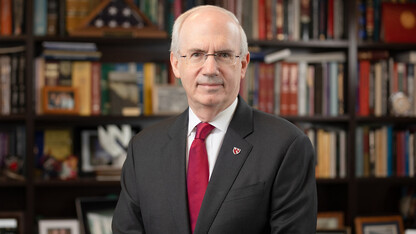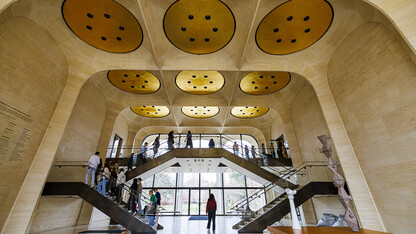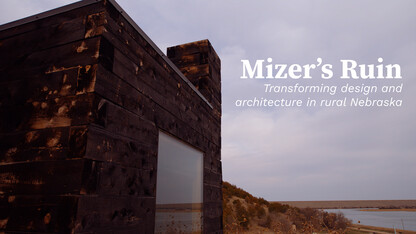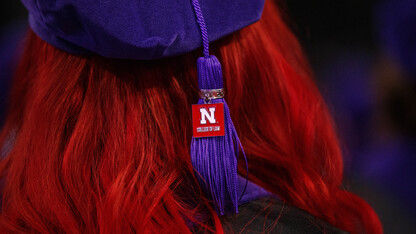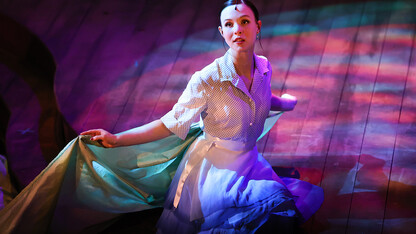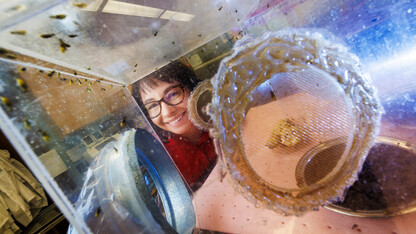· 9 min read
Giannakas fulfills lifelong dedication to helping others
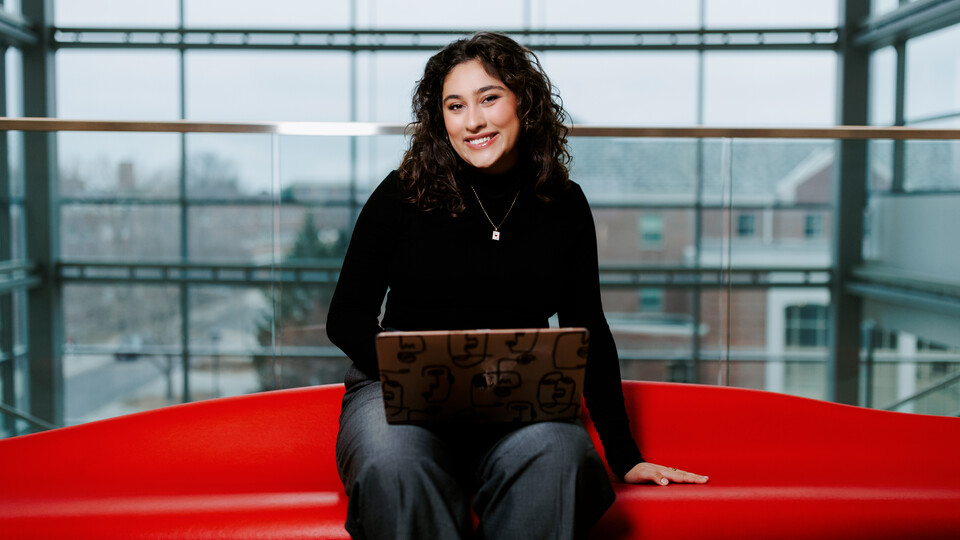
Editor’s Note — This is part of a student conversation series featured on the University of Nebraska–Lincoln’s Medium page. The series highlights Huskers who are making positive impacts on campus, in their outreach work, and career paths.
Ritsa Giannakas began making an impact on the campus community before she was even a student when, at 13, she started an emergency fund for students in the College of Agricultural Sciences and Natural Resources. Now, Giannakas, a senior political science and economics major, continues to make impacts through work with the Association of Students of the University of Nebraska, as a mentor and in her research.
You started an emergency fund for CASNR students when you were 13. What sparked that for you?
I don’t know the exact moment that I became aware of just how much inequality there existed in the world, but what I can tell you is that I was getting into arguments advocating for universal health care since I was in fifth grade. I have always strongly held values of equity and helping others, something that was definitely passed down to me by my parents, family members, and community — especially growing up around people from all different backgrounds, religions, socioeconomics and walks of life. Both of my parents are educators and the education they pursued was incredibly important to them starting their lives here as immigrants from Greece and Lebanon.
I have never once doubted the importance of higher education both as a tool for social mobility and as the most critical way to develop your worldview and critical thinking skills. So, when my mother — a CASNR faculty member — brought up that the number of students struggling financially was increasing and impacting their ability to be successful in college, it was automatic that I asked to donate the little money I had as a 13-year-old to help these students. I was genuinely not expecting CASNR to be as touched as they were by this gesture. I honestly thought that the donation was going to be anonymous. I just didn’t think twice about making the founding donation for what would end up being the CASNR Emergency Student Aid Fund. Even though it wasn’t expected, I am still honored to have been recognized in the way I was and so grateful for the folks at CASNR and the incredible repeat donors who have done the heavy lifting to make the fund a reality and maintain it to this day.
Is it still active? Can you speak to its impact?
The fund is definitely still active, and I would encourage anyone who is able to donate. We have helped dozens of students make it through college who otherwise would not have been able to due to their financial situation — something I would say is pretty incredible for a donation-funded campaign that most people at the university don’t even know is a resource for them. This is made possible by incredibly consistent donations (including from myself and my family every year), from people who really value education and giving back to students — and I am so grateful that because of this consistent support, the fund is still running. I really hope that the fund gets more attention in the coming years, not only so that we can continue attracting donors and making a difference, but also because most students don’t even know it’s a resource for them.
You’re an economics tutor for the College of Business. Was helping others something instilled in you early on?
As cliche as this sounds, helping others has honestly been what has guided the vast majority of my decisions throughout college. Specifically, I have always loved taking on a teaching/mentoring role, starting in high school as a volunteer for local elementary schools and continuing in college as a mentor in NHRI Leadership Mentoring and my job as a teaching assistant and course tutor for multiple classes (including econometrics at the College of Business). It is something that brings me so much joy and fulfillment, and I really do adore my students and look forward to teaching my labs and working with them one-on-one each week. In general, though, helping others has been the purpose of my work in ASUN, internships at nonprofits, my research, etc., and these experiences have inspired me to continue research and teaching as a career once I graduate.
You were awarded a UCARE grant and have gotten other research experience in labs. How has undergraduate research shaped your college experience?
One of the most rewarding parts of attending Nebraska has been the ability to conduct research. Since I was in high school, I’ve taken advantage of the research opportunities here and have loved it. Taking part in research has been integral to my college experience and growth as a person — and not only in the obvious way of preparing me for classes and making me competitive for graduate school. In fact, doing research here has fully shaped the trajectory of my career. In high school, I was convinced I was going to study biochemistry, but doing a biology research internship quickly showed me that my talents were probably better suited elsewhere.
Working as a data analyst and really focusing on the quantitative side of research while in college taught me to code and is the reason that I declared a statistics minor and later decided to completely shift focus into pursuing statistics as a career. Had I not had the research experiences I did at UNL, I definitely would have not done as well academically, but I also would not have broadened my horizons, realized interests I didn’t know I had and developed my own critical thinking skills in the process.
Why did you want to be part of ASUN and what impact are you hoping to leave through your position?
I joined ASUN my sophomore year as a member of the Diversity, Equity, and Inclusion committee and immediately fell in love with the organization and the people I met there. My committee chairs were phenomenal and you could tell that you were surrounded by people who were optimistic about the world and their ability to make change, even just on campus. I felt connected to DEI specifically because I have always been an advocate and activist within my community, and DEI issues are especially important to me given my experience as a daughter of immigrants and someone with a unique ethnic background. After my first year, I won my election the following two years to become a senator for the College of Arts and Sciences and served for over a year as committee co-chair for the DEI committee.
This might be one of the best decisions I made in college. I met incredible people who never fail to inspire me (many of whom would become my close friends), learned a lot about university bureaucracy and having to work around significant roadblocks to make things happen. I got leadership experience managing the best committee and group of people and was able to further my goal of making change on campus and in the community I grew up in. In addition to the impact of the projects I either spearheaded or helped others complete, I hope to have impacted the organization through my presence as someone who is always willing to stand up for what I believe in and speak up even when others are scared to. I also hope to have changed the organization for the better through my and others’ work to make ASUN itself more inclusive and to foster its relationships with others RSOs on campus.
Is there anything you hope to accomplish in your lifetime?
In terms of shorter-term goals, I am hoping to finish graduate school with a doctorate and become a professor at a university. I hope that I get to continue working with bright students who are going to change the world with their research; and I hope that I am able to continue doing the fascinating research I have been conducting as a career. Above all, though, I hope that I am able to hold onto my whimsy and optimism about making the world a better place. It’s easy to get jaded when doing advocacy and/or research work into complex and sensitive topics, especially when it seems like there is so much going on in the world and you don’t even know where to start in fixing it. I hope that I can hold onto the drive and passion I have had up until this point and use it in a way that is fulfilling and change-making.
What or who inspires you?
This is such a hard question since I am inspired in different ways by everyone I meet, especially being surrounded by such incredible people in my everyday life. My family has definitely been the most influential for me, though, especially with how they shaped my values and drive. My parents both came from difficult circumstances where the odds of success were stacked against them. But because of their drive, they were able to accomplish so much and provide a better life for me and my brother — all while being incredibly kind, funny and wonderful people as a whole.
I am inspired by their parents (my grandparents) as well — not only for making my parents into the people they were, but also for having left an incredible legacy themselves. My grandmother in Lebanon was a social worker for most of her life and fought for issues like workers’ rights and access to contraception for vulnerable women — all while Lebanon was experiencing invasions from its neighbors, civil war and economic catastrophe. My grandmother in Greece managed her own business and helped bring the family out of poverty and was extremely politically active at a time when women were encouraged to stay home and be seen and not heard. And even when things were at their roughest financially, she, to this day, will always accept a struggling stranger into her home and prioritize her community before herself (all while being one of the kindest and wittiest people I have met). I come from a long line of strong, trailblazing women (and men, of course), and I truly hope to be able to live up to their legacies.
What is your advice to other students looking to make an impact on campus?
No matter what, get involved. Whether it’s Greek Life or UPC or NHRI, there are so many opportunities out there for you. If you are a change-maker or you have an issue you really care about, I cannot recommend joining ASUN (or FCLA if you are an incoming freshman) enough — there is truly a place for everyone, and you learn about integral positions and happenings on campus you otherwise might not have known existed.
Even if you just dip your toes in the water through something as simple as joining a sorority or a more fun organization like Karaoke for a Kause, you meet such a wide variety of people who are all doing their own amazing things in their community. Plus, being around people who are as passionate and dedicated as you are provides support and prevents burnout, something that you don’t expect to be as big of an issue as it is when you start doing advocacy work on campus and beyond.
